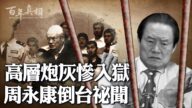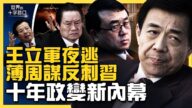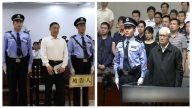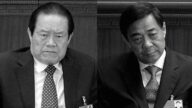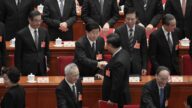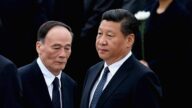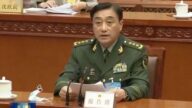【新唐人2013年08月30日訊】在前重慶市委書記薄熙來庭審期間,中共針對一些在網上發佈敏感信息的博客作者,展開一系列的打擊行動,外界認為,當局擔心薄熙來案會引起更多有關中國民生和政改問題的討論,這是當局最不樂見的。而薄案庭審才結束,中共公安部部長郭聲琨,就首次以所謂的國家反恐工作領導小組組長身份亮相,被外界認為,「嚴打」將再現。學者指出,重刑過度使用的「嚴打」,釀成了無數冤假錯案。民眾需要的是司法獨立,而不是運動式的執法。
薄案一審宣告落幕後,8月27號,中共成立了國家反恐工作領導小組並召開了第一次會議。擔任組長的郭聲琨在會議上講話。他聲稱,要把中國的反恐工作推上一個所謂的新臺階,他還提出了「打早打小、露頭就打」的原則,講話中他用了摧毀、剷除等顯示強硬的詞彙。
此外,中共喉舌發表文章紀念,上星期在新疆喀甚地區警方襲擊維族人過程中,喪生的一名當地武警官員。從而間接證實了外界廣為流傳的新疆又一起流血衝突。
時事評論員汪北稷:「嚴打」是非法、非理性的社會治安處理的運動,在這運動的背後核心是處理政治異己份子,我們需要的是法律的尊嚴,法治的獨立,司法的獨立,而不是運動式的執法。」
事實上,生活在中國的民眾對「嚴打」並不陌生。1976年,中共第一代領導人毛澤東一手發動的「文革」浩劫落幕,取而代之的新運動是第二代領導人鄧小平的「嚴打」。
1983年,鄧小平在北戴河向公安部發出指令:對於當前的各種嚴重刑事犯罪要嚴厲打擊,判決和執行,要從重、從快﹔「嚴打」就是要加強黨的專政力量,這就是專政。這場運動開了司法機關在運動式集中執法中「重結果、輕程序」的先例。
從此,一場上至權貴、下至平民的「嚴打」活動席捲中國大陸。當時在很多公共場所牆壁上經常可以看到貼著一整片的槍決名單。
據記載,在嚴打活動中,有一位男青年只因為幫女友拍了一些穿著較為暴露的照片,就被判處死刑,女青年被判了有期徒刑﹔在西安,一名叫馬燕秦的中年婦女因組織地下舞會,被污衊為「亂搞兩性關係」,判處死刑﹔還有因為朋友之間的打賭去吻過路女孩,也被判處死刑的荒唐案例,其中發生的各種冤假錯案,到現在很多還沒有得到平反。
時事評論員汪北稷:「其實『嚴打』現在也在做啊,剛剛審判完的薄熙來在重慶打黑,就是抄襲毛澤東的『鎮反』,抄襲了鄧小平的『嚴打』,用運動式的方法,抄家式的方法,甚至延至滿門抄斬、株連九族、酷刑伺候的方法,他就是用黑社會的方法來管理重慶市政府。」
此外,最近當局也在加強對網路謠言的「嚴打」。資料顯示,有數百人因言獲罪,僅海南和河南兩省就有600多人被警方處理。中共喉舌媒體也加大力度炒作有關微博作者被逮捕的消息。
中共當局對互聯網加緊管理的時間點,正好是薄熙來案庭審之際。據了解,這些所謂的謠言大部分是質疑當局的公信力,有不少則是批評政府行政不作為,或者不滿當局的腐敗。
外界認為,當局擔心薄熙來案會引起更多這方面的討論,所以祭出「嚴打」來管控、收緊網絡言論。然而學者更擔心,「嚴打」之下必有冤案。
時事評論員汪北稷:「我們可以完善這個司法體系,完善這個法律,但是不能破壞法律,一旦把法律扔掉了,沒有一個人有安全感。」
「可抓可不抓的,堅決抓﹔可判可不判的,堅決判﹔可殺可不殺的,堅決殺」,這是中共「嚴打」的宣傳口號。在司法不獨立的情況下,「嚴打」導致刑訊逼供、權力濫用,後果可以想像。
採訪/陳漢 編輯/黃億美 後製/周天
China Sees “Severe Crackdown” Campaign Soon
During the Bo Xilai trial, the Chinese Communist Party (CCP)
launched a new crackdown on netizens for their
“sensitive” messages on the Internet.
Outsiders think the motive behind this is that the CCP fears
Bo´s trial will trigger more public discussion of livelihood issues and political reform.
Just after the end of Bo´s trial, Guo Shengkun, the CCP
police chief, chaired the first meeting of the national anti-terrorism steering team.
Observers speculate that a “severe crackdown”
campaign will soon recur in China.
Scholars point out that numerous unjust cases
are the result of historical “severe crackdown” campaigns.
The public needs an independent judiciary
instead of campaign-style law enforcement.
The day after the first stage of the Bo Xilai trial ended,
the CCP-led anti-terrorism group held its first meeting.
Guo Shengkun, the team leader, gave a speech.
He declared to promote China´s anti-terrorism
“to a new level.”
He put forth an “early eradication” policy, using strong
words in his speech, such as “destruction,” “eradication,” etc.
Meanwhile, the CCP official media published articles
mourning a local policeman who died last week
in a clash in Kashi, Xinjiang.
The news indirectly proved a new violent clash
in Xinjiang, which has been widely circulated.
Commentator Wang Beiji: “The ‘severe crackdown
on criminal activities’ is an illegal and irrational campaign
in dealing with social security.
Its real motive is to purge the political dissidents.
What we need is rule of law, judicial independence,
instead of a campaign-style law enforcement."
The term “severe crackdown” is nothing new to the Chinese.
In 1976, the 10-year long Cultural Revolution ended.
A new campaign, “severe crackdown on criminal activities”
ensued, dominated by Deng Xiaoping, the 2nd generation CCP leader.
In 1983, Deng Xiaoping instructed police authorities
to severely crack down on serious criminal crimes.
The criminals shall be given heavy penalties
and quick execution.
Deng said, “The harsh crackdown is to reinforce
the Party´s dictatorship power.”
This set a precedent for the judiciary to “emphasize
punishment and overlook legal procedures” in case trials.
A harsh crackdown campaign then swept across China.
Large posters with names of persons to be executed posted
on walls were commonly seen in public places.
Reportedly, during the crackdown,
a young man was executed for taking photos of
his girlfriend who wore inappropriate clothing.
His girlfriend was put in jail.
In Xi´an city, a middle-aged woman was executed
for organizing an social dance party.
A man was executed for betting with his friends
to kiss a girl who passed by.
Many unjustly charged people in the crackdown
have yet to be rehabilitated.
Wang Beiji: “Now the severe crackdown still continues.
Bo Xilai’s anti-vice campaign in Chongqing
was actually a replica of Mao Zedong’s
‘suppressing counter-revolutionaries’ and
of Deng Xiaoping´s ‘harsh cracking’.
That is a movement accompanied with house-searching,
confiscated property, and torture.
They could even kill the victims’ family members
and punish all the relatives.
Bo just governed Chongqing with mafia-style practices.”
Severe crack downs have recently been given by the CCP
authorities to those releasing “rumors” on the Internet.
Public data shows that several hundreds of citizens
have been arrested for “Speech Crimes.”
Over 600 people in Hainan and Henan Provinces
have been detained by local police.
The CCP official media have hyped up news
about the arrest of relevant bloggers.
The official tightening of Internet censorship was
happening during the period of Bo Xilai trial.
It is believed that these “rumors” were mainly
questioning the credibility of the CCP authorities.
Some of them were criticism of the government´s
non action, whilst some were resentful of its corruption.
Outsiders think the reason behind the severe
crackdown and tightening Internet control was
due to the CCP´s attempt to abate further
public attention to Bo´s trial.
Scholars worry that the harsh repression would
surely create unjust cases.
Wang Beiji: “We shall improve and perfect the
judicial system and the law instead of destroying it.
Once the law was abandoned, no one felt safe.”
The following are the severe crackdown slogans:
“Be sure to arrest those who can be arrested;
Be sure to convict those who can be given guilty verdicts;
Be sure to execute those who can be sentenced to death.”
It´s no surprise to see lack of judicial independence
in China, rampant extortion of confessions by torture,
and abuse of state power.


